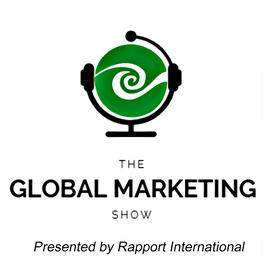
Cultural Intelligence Drives Biotech Success - Show #141
Maria Kondratyev is the founder and CEO of Aeterna Therapeutics, a San Diego-based biotech startup driving innovation in treating metabolic diseases, particularly in pediatric patients with growth hormone deficiency. The company’s technology transforms daily hormone injections into monthly treatments, a crucial step in refining patient care and compliance. “It is life-changing,” Maria adds. “I gave you an example of gross hormone deficiency, but really, there are a lot of different diseases, including oncology, obesity, and diabetes, where we can use this same concept, and we're going to expand there once we grow a little bit.” Maria's story is particularly compelling. Born in Moscow, raised in Tel Aviv, educated in Canada, and now leading a company in San Diego, Maria brings a unique perspective to international business development. She discusses how technical terms can vary significantly across languages and educational systems, even between herself and her mom: "My mom was also a scientist, a biologist... She got all of her education in Moscow. But when she speaks to me about things like PCR, which we see in the lab all the time, I have no idea what she means." Maria and Wendy connected at the Redefining Early Stage of Investment (RESI) Conference in Boston, an event hosted by Life Science Nation. (Wendy recently interviewed Dennis Ford, founder and CEO of Life Science Nation, which specializes in fundraising for life sciences companies.) In this episode, Maria describes how an international mindset and cultural intelligence create unique opportunities in the biotech industry. Building Bridges Across Borders As the company moved from research to commercialization, Maria's multicultural approach generated inroads into different business cultures, resulting in Canadian commercialization grants and collaboration with Brazilian investors. Maria encourages entrepreneurs to be open-minded: "Sometimes you're not sure how to talk to a person who was raised in a different environment," she admits. "What means one thing in one culture can mean something completely different in another." Over time, that international mindset evolves into a keen awareness of cultural nuances, creating opportunities that might never have materialized. The complexity deepens when dealing with scientific innovations that may not have equivalent terms in other languages. With patent translations, for example, sometimes there is no direct translation for new technical terms. In such cases, a professional translator must decide whether to create new terminology, keep the original language, or develop descriptive translations that accurately capture the concept. The Power of Cultural Intelligence Maria offers several key insights for entrepreneurs navigating international markets: 1. Rely on professionals even though you speak the language. Maria speaks four languages (English, Russian, Hebrew, and French); however, in her experience, technical and scientific communication require more than basic language skills. Professional translation services become crucial, mainly when dealing with specialized terminology that might not have direct equivalents across languages. 2. Pay attention to cultural nuances. Maria has seen how something as simple as smiling – or not smiling – can be interpreted differently across cultures. Once, while dining with Israeli visitors in a Chinese restaurant in Toronto, her Israeli guests initially interpreted the server's serious demeanor as rudeness. "But she's not rude," Maria explains. "It would be rude for her to smile at you because, in their culture, you smile at your very close family or friends. It's impolite to smile at a stranger." Maria suggests an unconventional but effective approach for those seeking to better understand different cultures: consuming media from target markets. Read literature, read fiction, watch Friends... When I met Brazilian people, I started to research what kind of books they read growing up," she explains. This approach helped her understand the context in which different cultures conduct business. 3. Know your audience. Maria uncovers distinct differences between academic and commercial environments across borders. In Toronto, she found excellent academic support but limited commercial opportunities. The move to San Diego's vibrant biotech ecosystem provided the entrepreneurial environment to transform academic research into a viable commercial venture. The transition wasn't just geographically driven; it required adapting to different business cultures. San Diego's collaborative atmosphere, where "you go to a brewery and meet many people who are all starting biotech companies," contrasts sharply with Toronto's more academically focused environment. This cultural shift proved crucial in helping Maria refine her business approach and secure initial funding. An open-minded approach to cultural awareness and language learning also helps at conferences like RESI, where she met investors from multiple countries every half hour. She says the ability to quickly adjust communication styles is essential, and it helps you learn a lot more when moving from country to country. It is the key to unlocking global business opportunities. Listen to the full episode to learn more about finding early-stage funding for your biotech innovation, where to look for funds internationally, and the many factors – including translation – that drive the product lifecycle. Links: Website: https://www.linkedin.com/company/aeterna-therapeutics/ LinkedIn: https://www.linkedin.com/in/maria-kondratyev-7687951/ Connect with Wendy - https://www.linkedin.com/in/wendypease/ Music: Fiddle-De-Dee by Shane Ivers - https://www.silvermansound.com
From "The Global Marketing Show"


Comments
Add comment Feedback